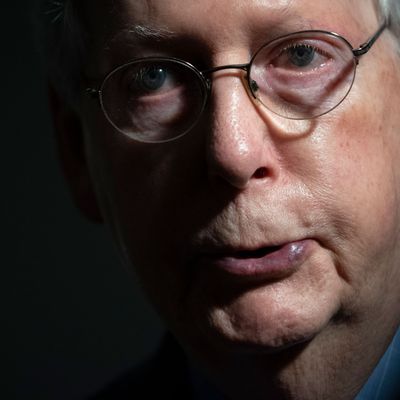
Last week, the United Kingdom’s Conservative Party unveiled a plan to keep British workers paid and employed for the duration of the coronavirus crisis. The Tory proposal would effectively cover 80 percent of sidelined workers’ salaries, while forbidding employers who accept the government’s help from laying off staff. The policy closely resembles one implemented by Denmark’s Social Democrats, except that Boris Johnson’s wage-replacement rate is slightly more generous than the Danish left’s. Although the Conservatives have a well-earned reputation for sacrificing Britain’s vulnerable on the altar of deficit reduction, even they recognize that social welfare must take precedence over budgetary concerns in the context of a historically sudden and deep economic crisis. On Friday, Tory chancellor Rishi Sunak announced that there would be no limit on the funding available for covering workers’ wages.
“We are starting a great national effort to protect jobs,” Sunak said. “We want to look back on this time and remember how in the face of a generation-defining moment we undertook a collective national effort and we stood together.”
America’s conservatives see things differently.
U.S. workers are every bit as exposed to the COVID-19 pandemic and its economic side effects as their peers across the pond. Unlike their British counterparts, however, American laborers aren’t guaranteed affordable health care if they lose their jobs, nor any amount of paid sick leave should they take ill. And yet, despite our workers’ unique vulnerability to the harms of illness and unemployment, congressional Republicans are not only unwilling to support universal paid leave or make an open-ended commitment to covering 80 percent of workers’ salaries but are also fighting to protect the right of bailed-out corporations to fire as many workers as they see fit.
On Sunday, the Senate failed to reach an agreement on an already belated economic relief package, a development that’s left small-business owners and laid-off workers reeling and financial markets tumbling. The mainstream press has attributed the Senate’s inaction to “Washington infighting,” or else to Democratic intransigence. But Chuck Schumer’s caucus didn’t vote down the Republican bill over some minor detail, or because it insisted on dictating the left’s preference on an issue that genuinely divides blue and red America. Rather, the key sticking point is that the GOP bill would empower the Trump administration to dole out $500 billion in bailout money to corporations of its own choosing — without forbidding bailed-out firms from laying off their workers. This arrangement would not only allow the hotelier-in-chief to plow public money into his companies and those of his cronies but also enable those firms to spend our government’s dollars on maintaining outsize executive compensation instead of retaining employees.
Senate Democrats have other conditions they would like to attach to the corporate bailouts, and some quibbles with other sections of the existing bill. But the GOP’s insistence on subsidizing corporations that fire workers in the middle of a pandemic appears to be the Democrats’ paramount concern.
Critically, the Republican Party’s opposition to requiring bailed-out firms to retain at least 90 percent of their workers does not reflect the uniquely pro-management bent of public opinion in the U.S. The disparity between the Tory and GOP stances has approximately nothing to do with any ideological divergence between their mass constituencies.
Data for Progress, a progressive think tank, released a poll Monday gauging public support for Elizabeth Warren’s list of conditions for corporate bailouts. Many of the senator’s stipulations attracted mere plurality or only narrow majority support. But when asked whether companies that accept government aid should be required to maintain their payrolls, 74 percent of respondents said yes. The requirement was nearly as popular with GOP voters as it was among Democratic ones, with 70 percent of self-identified Republicans approving.
Senate Republicans have also insisted on (1) limiting an increase in unemployment benefits to three months, (2) making the bill’s cash-assistance provision a onetime payment instead of a subsidy guaranteed to recur for the duration of the crisis, and (3) capping relief funds for small business at a fraction of the level recommended by conservative economists like Glenn Hubbard and Michael Strain.
What makes Mitch McConnell’s principled stance in favor of subsidizing corporate layoffs and penny-pinching on aid to workers and small businesses most remarkable is that it runs directly counter to his party’s political interests. Donald Trump’s reelection is quite likely to hinge on whether economic growth resumes by midsummer. The bulk of the Democratic demands that McConnell is rejecting — more expansive aid to workers, consumers, state governments, and small businesses (that agree to retain their staff) — would increase the probability of a “V-shaped recovery,” and thus, of Trump renewing his lease on the White House.
Therefore, the gulf between the GOP’s response to the crisis and that of Britain’s Tories is not a product of public opinion or crass electoral concerns. Rather, it reflects the fact that the Republicans are not a normal conservative party, but a uniquely reactionary political formation. No other major party in the Western world rejects the concept of universal health care or disputes the reality of man-made climate change. The GOP is more adamantly opposed to the downward redistribution of resources, or any measure that tips the balance of power between workers and bosses in the former’s direction, than any center-right party in the developed world.
Republicans’ uniquely virulent strain of conservatism is undermining not only their response to COVID-19’s economic consequences but also to the public-health crisis itself. Even as U.S. hospitals and health-care workers are suffering from a shortage of masks and ventilators, President Trump has refused to invoke his authority under the Defense Production Act to force the mass production of those critical materials. Instead of conscripting domestic manufacturers into the figurative war on the coronavirus, the White House has attempted to arrange a voluntary consortium of firms interested in aiding with mask and ventilator production. According to the New York Times, this decision came at the behest of the U.S. Chamber of Commerce. Trump defended his approach Sunday on the grounds that “we’re a country not based on nationalizing our business.” Of course, invoking the DPA to temporarily commandeer a firm’s productive capacity is not tantamount to the nationalization of industry. Meanwhile, the voluntarist approach mandated by the GOP’s devotion to corporate prerogatives is not delivering the goods:
[I]t is far from clear that the effort to enlist companies like General Motors, Apple and Hanes, just a few of the firms that have promised to free up existing supplies of masks or repurpose 3-D printers to produce ventilator parts, constitutes an effective strategy.
In interviews with participants in the process, from business executives to government officials, there is still widespread confusion about how much and what exactly each firm is supposed to produce. Corporate executives say they face a bewildering number of requests from dozens of nations around the world, along with governors and mayors around the country, for scarce supplies. The White House has not said who will set the priority list for deliveries. And it is not clear that any of it will arrive in time for the cities and the states that are hit the hardest, including New York.
… By Saturday, Parkdale Mills joined Hanes, Fruit of the Loom and other companies in announcing a coalition to produce masks. But they are not the kind hospitals most need. The new masks will be made of a three-ply underwear fabric, and do not provide the level of protection given by the N95 masks that health care workers need for intubation and other procedures.
The president’s laissez-faire approach to redressing potentially lethal shortages of critical medical equipment would be alarming enough in isolation. But it is especially disconcerting when combined with Trump’s recent signals that he intends to relax his administration’s social-distancing advisories in the near-term future. If the president is going to encourage businesses to reopen and public life to resume in a manner of days, the least he could do is use every authority at his disposal to expand treatment capacity at America’s hospitals.
But the ideological hang-ups (and/or fiduciary duties) of the American conservative movement won’t let him.
For this reason, the wealthiest nation in human history appears to be on the cusp of allowing mass business failures and layoffs — and then attempting to redress those preventable economic harms by prematurely suspending social-distancing measures, thereby condemning many of its people to death by suffocation in hospital hallways.
This outcome can still be averted. Senate Republicans have evinced some capacity for subordinating their ideological convictions to political and economic necessity. And Democrats certainly have their own responsibility not to let the perfect be the enemy of the “good enough for now.” Given the urgent necessity of getting cash in the hands of beleaguered workers and businesses, if the GOP is willing to table the debate over corporate bailouts — and immediately pass a bill dispensing cash assistance to households and aid to small businesses (that commit to retaining workers) — Democrats should play ball.
But, as of this writing, McConnell is not offering such a deal. And so long as that’s the case, mainstream news outlets must not attribute the relief package’s delay to small-minded partisanship or Democratic intransigence, but rather to the Republican Party’s singular commitment to the prerogatives of plutocrats.
































